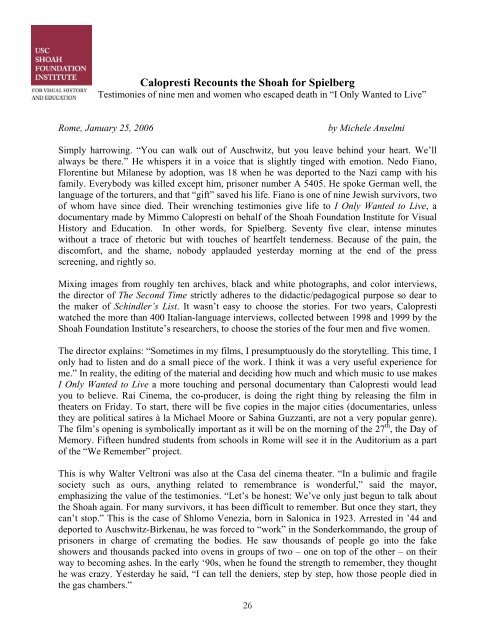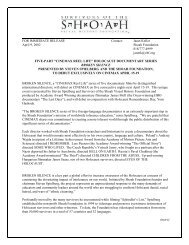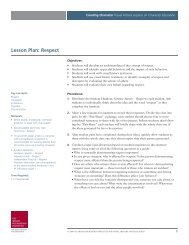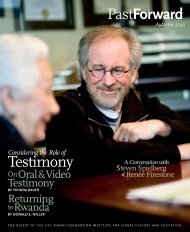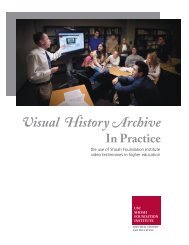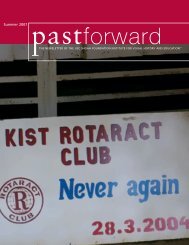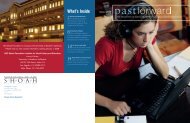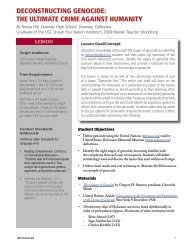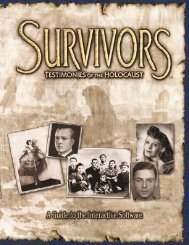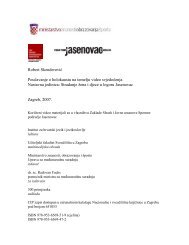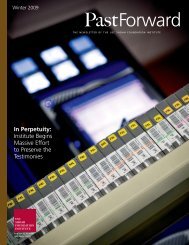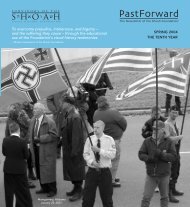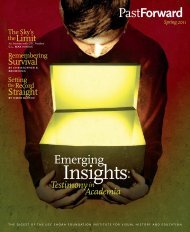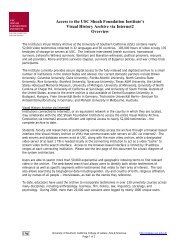Download the Volevo solo vivere press kit - USC Shoah Foundation ...
Download the Volevo solo vivere press kit - USC Shoah Foundation ...
Download the Volevo solo vivere press kit - USC Shoah Foundation ...
You also want an ePaper? Increase the reach of your titles
YUMPU automatically turns print PDFs into web optimized ePapers that Google loves.
il Giornale (Daily Italian Newspaper)Calopresti Recounts <strong>the</strong> <strong>Shoah</strong> for SpielbergTestimonies of nine men and women who escaped death in “I Only Wanted to Live”Rome, January 25, 2006by Michele AnselmiSimply harrowing. “You can walk out of Auschwitz, but you leave behind your heart. We’llalways be <strong>the</strong>re.” He whispers it in a voice that is slightly tinged with emotion. Nedo Fiano,Florentine but Milanese by adoption, was 18 when he was deported to <strong>the</strong> Nazi camp with hisfamily. Everybody was killed except him, prisoner number A 5405. He spoke German well, <strong>the</strong>language of <strong>the</strong> torturers, and that “gift” saved his life. Fiano is one of nine Jewish survivors, twoof whom have since died. Their wrenching testimonies give life to I Only Wanted to Live, adocumentary made by Mimmo Calopresti on behalf of <strong>the</strong> <strong>Shoah</strong> <strong>Foundation</strong> Institute for VisualHistory and Education. In o<strong>the</strong>r words, for Spielberg. Seventy five clear, intense minuteswithout a trace of rhetoric but with touches of heartfelt tenderness. Because of <strong>the</strong> pain, <strong>the</strong>discomfort, and <strong>the</strong> shame, nobody applauded yesterday morning at <strong>the</strong> end of <strong>the</strong> <strong>press</strong>screening, and rightly so.Mixing images from roughly ten archives, black and white photographs, and color interviews,<strong>the</strong> director of The Second Time strictly adheres to <strong>the</strong> didactic/pedagogical purpose so dear to<strong>the</strong> maker of Schindler’s List. It wasn’t easy to choose <strong>the</strong> stories. For two years, Caloprestiwatched <strong>the</strong> more than 400 Italian-language interviews, collected between 1998 and 1999 by <strong>the</strong><strong>Shoah</strong> <strong>Foundation</strong> Institute’s researchers, to choose <strong>the</strong> stories of <strong>the</strong> four men and five women.The director explains: “Sometimes in my films, I presumptuously do <strong>the</strong> storytelling. This time, Ionly had to listen and do a small piece of <strong>the</strong> work. I think it was a very useful experience forme.” In reality, <strong>the</strong> editing of <strong>the</strong> material and deciding how much and which music to use makesI Only Wanted to Live a more touching and personal documentary than Calopresti would leadyou to believe. Rai Cinema, <strong>the</strong> co-producer, is doing <strong>the</strong> right thing by releasing <strong>the</strong> film in<strong>the</strong>aters on Friday. To start, <strong>the</strong>re will be five copies in <strong>the</strong> major cities (documentaries, unless<strong>the</strong>y are political satires à la Michael Moore or Sabina Guzzanti, are not a very popular genre).The film’s opening is symbolically important as it will be on <strong>the</strong> morning of <strong>the</strong> 27 th , <strong>the</strong> Day ofMemory. Fifteen hundred students from schools in Rome will see it in <strong>the</strong> Auditorium as a partof <strong>the</strong> “We Remember” project.This is why Walter Veltroni was also at <strong>the</strong> Casa del cinema <strong>the</strong>ater. “In a bulimic and fragilesociety such as ours, anything related to remembrance is wonderful,” said <strong>the</strong> mayor,emphasizing <strong>the</strong> value of <strong>the</strong> testimonies. “Let’s be honest: We’ve only just begun to talk about<strong>the</strong> <strong>Shoah</strong> again. For many survivors, it has been difficult to remember. But once <strong>the</strong>y start, <strong>the</strong>ycan’t stop.” This is <strong>the</strong> case of Shlomo Venezia, born in Salonica in 1923. Arrested in ’44 anddeported to Auschwitz-Birkenau, he was forced to “work” in <strong>the</strong> Sonderkommando, <strong>the</strong> group ofprisoners in charge of cremating <strong>the</strong> bodies. He saw thousands of people go into <strong>the</strong> fakeshowers and thousands packed into ovens in groups of two – one on top of <strong>the</strong> o<strong>the</strong>r – on <strong>the</strong>irway to becoming ashes. In <strong>the</strong> early ‘90s, when he found <strong>the</strong> strength to remember, <strong>the</strong>y though<strong>the</strong> was crazy. Yesterday he said, “I can tell <strong>the</strong> deniers, step by step, how those people died in<strong>the</strong> gas chambers.”26


